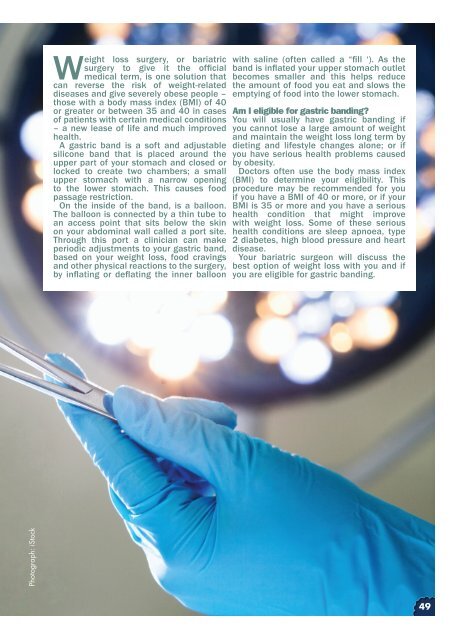Obese Britain Summer 2015.pdf
A magazine about Healthy Living, Weight Loss, Exercise and Dieting. Distributed with the Guardian on the 27th June 2015 www.obesebritain.com
A magazine about Healthy Living, Weight Loss, Exercise and Dieting. Distributed with the Guardian on the 27th June 2015 www.obesebritain.com
Create successful ePaper yourself
Turn your PDF publications into a flip-book with our unique Google optimized e-Paper software.
Weight loss surgery, or bariatric<br />
surgery to give it the official<br />
medical term, is one solution that<br />
can reverse the risk of weight-related<br />
diseases and give severely obese people –<br />
those with a body mass index (BMI) of 40<br />
or greater or between 35 and 40 in cases<br />
of patients with certain medical conditions<br />
– a new lease of life and much improved<br />
health.<br />
A gastric band is a soft and adjustable<br />
silicone band that is placed around the<br />
upper part of your stomach and closed or<br />
locked to create two chambers; a small<br />
upper stomach with a narrow opening<br />
to the lower stomach. This causes food<br />
passage restriction.<br />
On the inside of the band, is a balloon.<br />
The balloon is connected by a thin tube to<br />
an access point that sits below the skin<br />
on your abdominal wall called a port site.<br />
Through this port a clinician can make<br />
periodic adjustments to your gastric band,<br />
based on your weight loss, food cravings<br />
and other physical reactions to the surgery,<br />
by inflating or deflating the inner balloon<br />
with saline (often called a “fill ‘). As the<br />
band is inflated your upper stomach outlet<br />
becomes smaller and this helps reduce<br />
the amount of food you eat and slows the<br />
emptying of food into the lower stomach.<br />
Am I eligible for gastric banding?<br />
You will usually have gastric banding if<br />
you cannot lose a large amount of weight<br />
and maintain the weight loss long term by<br />
dieting and lifestyle changes alone; or if<br />
you have serious health problems caused<br />
by obesity.<br />
Doctors often use the body mass index<br />
(BMI) to determine your eligibility. This<br />
procedure may be recommended for you<br />
if you have a BMI of 40 or more, or if your<br />
BMI is 35 or more and you have a serious<br />
health condition that might improve<br />
with weight loss. Some of these serious<br />
health conditions are sleep apnoea, type<br />
2 diabetes, high blood pressure and heart<br />
disease.<br />
Your bariatric surgeon will discuss the<br />
best option of weight loss with you and if<br />
you are eligible for gastric banding.<br />
Photograph: iStock<br />
49



